The BC Ministry of Agriculture’s Business Development Unit, under the Business Knowledge and Strategic Adaptation program, has engaged Hartley Berg to deliver primary marketing and business development consulting to support industry growth across British Columbia.
As part of this initiative, Hartley Berg delivered eight instructional modules tailored to the Food Processor sector. These modules cover essential business management and growth strategies, serving as invaluable resources for industry professionals. Through this work, Hartley has fostered strong relationships with clients, helping businesses optimize operations, scale effectively, and enhance their competitive market positioning.
- Business planning: A process that integrates written goals with marketing, production and financial targets with human resource, risk, environmental and social considerations into a management strategy for the business.
- Market access and analysis: A process that looks at characteristics of industry and markets and success factors for marketing that include Product, Placement, Price, Promotion, and Competition.
- Production Economics/Cost of Production: A variable and fixed expense approach to measuring production systems and strategies for small scale food processing.
- Financial planning and management: Introduction to Balance Sheets, Cash Flow Statements, Current Ratio, Working Capital, Debt Structure, Debt to Equity, Equity Ratio, Debt Servicing, Return on Investment, and Gross Margin and their relationships to measuring the business’ financial health as well as how they answer questions for financial (lending) institutions and investors.
- Quality control requirements and regulations: A needs and potential impacts assessment of inspection requirements and protocols that impact production methods e.g. Food Processing and Regulations including food safety, packaging, facilities, risk managing the costs of recalls, safety controls, and resources.
- Product Development: A process that incorporates concept, prototype, testing, consistent results, recipe adaptation, stale dating, record keeping, audit process, required resources, and ongoing risk assessments.
- Labeling and packaging: The requirements for nutritional information, product UPCs, packaging design, language requirements, and attendant resources to meet Regulatory Agencies’ requirements and marketplace standards.
- Logistics: Material acquisition, product distribution and delivery and the interrelationship with promotional activities and marketing plans.
Each module supports a 60 to 75 minute workshop presentation and also be adaptable to Internet based self learning.
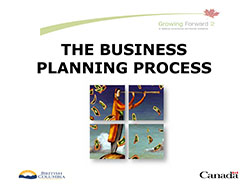
The Business Planning Process
PDF document
Click to view or print.
Right-click and Copy Link Location to share.

Market Access
PDF document
Click to view or print.
Right-click and Copy Link Location to share.
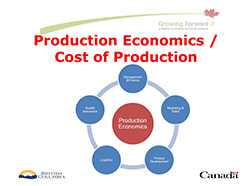
Production Economics
PDF document
Click to view or print.
Right-click and Copy Link Location to share.
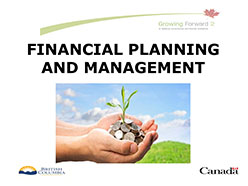
Financial Planning
PDF document
Click to view or print.
Right-click and Copy Link Location to share.
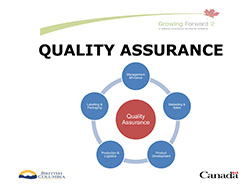
Qualty Assurance
PDF document
Click to view or print.
Right-click and Copy Link Location to share.
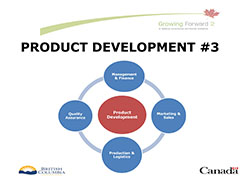
Product Development
PDF document
Click to view or print.
Right-click and Copy Link Location to share.
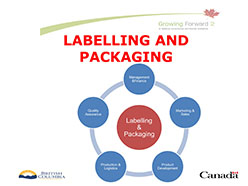
Labeling and Packaging
PDF document
Click to view or print.
Right-click and Copy Link Location to share.
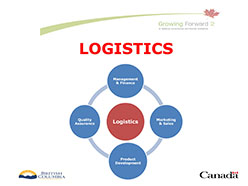
Logistics
PDF document
Click to view or print.
Right-click and Copy Link Location to share.

